| SHADOWS ON THE WALL | REVIEWS | NEWS | FESTIVAL | AWARDS | Q&A | ABOUT | TALKBACK | |||||
 Shadows off the beaten path Shadows off the beaten pathIndies, foreign, docs and shorts...
On this page:
BOBI WINE: THE PEOPLE'S PRESIDENT |
MY NAME IS ALFRED HITCHCOCK |
NAME ME LAWAND
| |||||
| See also: SHADOWS FILM FESTIVAL | Last update 20.Jun.23 | |||||
|
Bobi Wine: The People’s President Review by Rich Cline | 
| |||||
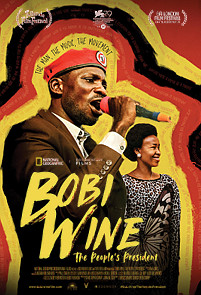 dir Moses Bwayo, Christopher Sharp prd Megan Hollinghurst, John Battsek with Bobi Wine, Barbie Kyagulanyi, Yoweri Museveni, Erias Lukwago, Kizza Besigye, Shalom Namagembe Kyagulanyi, Nubian Li, Dan Magic, Robert Amsterdam, Winnie Kiiza, Fergal Keane release US 28.Jul.23, UK 4.Aug.23 22/UK 2h01   Now streaming... |
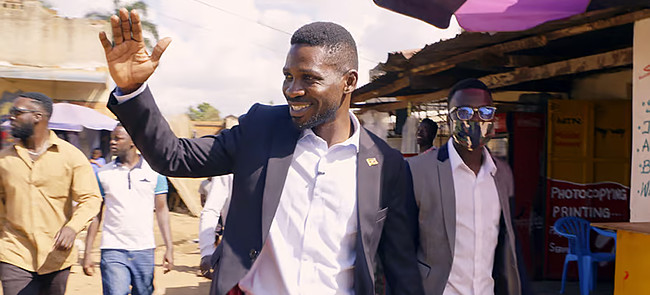 Skilfully shot and edited, this fly-on-the-wall documentary follows Ugandan musician-politician Bobi Wine over the course of seven years as he takes on one of Africa's most entrenched dictators. His personality shines brightly throughout the film, which resonates with his hopeful protest songs. And the more intensely violent situations he faces often turn the film into a nerve-shredding thriller. Meanwhile, his message connects with global political themes. Bobi Wine, aka Robert Kyagulanyi Ssentamu, is a force of nature. At age 32 in 2014, he takes a stand against Uganda's unjust regime through rousing speeches and populist anthems that target government corruption, low living standards, poor education and inadequate healthcare. Beloved for how he celebrates ghetto superstars, he preaches a message of freedom, peace, tolerance and human rights. After winning a seat in parliament in 2017, Bobi decides to boldly run for president in 2021. And of course President Yoweri Museveni, in office since independence in 1986, is determined to silence him. Cameras follow Bobi and his strong-willed wife Barbie closely through all of this, capturing the horrific torture and murder dished out by police and military loyal to Museveni, plus interview clips in which Museveni blames everything on the victims, foreign interference and homosexuals. It's plain to see how popular Bobi's opposing message is throughout the country, with huge street rallies packed with jubilant supporters. And watching them being crushed by such a heavy-handed government response is downright horrifying. The filmmakers remain centred around Bobi, Barbie and their four sparky children, as they respond to threats and actions aimed at them. Even after being seriously injured by police, Bobi heads straight back into the streets to meet the people with his loyal team, many of whom have also been arrested, attacked and even killed. The final section of the film chronicles the January 2022 election, which plays as a series of brutal efforts by Museveni to suppress any hint of true democracy. It isn't easy to watch a properly good-hearted man like Bobi continually being assaulted by government thugs and tried on trumped-up charges. But his tenacity is inspiring, as is the lovely connection he has with the fully involved Barbie. They also make sure their four children understand what's happening; even as they are sent away for safety the young ones know the source of the danger. So even if the filmmakers avoid some controversies, this is a striking public-private portrait of an outspoken freedom fighter.
| ||||
|
My Name Is Alfred Hitchcock Review by Rich Cline | 
| |||||
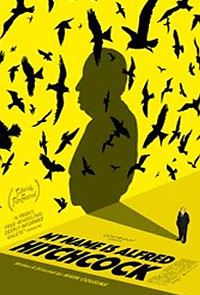 dir-scr Mark Cousins prd John Archer narr Alistair McGowan with Alfred Hitchcock, Janet Leigh, James Stewart, Grace Kelly, Cary Grant, Kim Novak, Anthony Perkins, Tippi Hedren, Gregory Peck, Ingrid Bergman, Farley Granger, Carole Lombard, Ivor Novello release US Sep.22 tff, UK 21.Jul.23 22/UK 2h00 Now streaming... |
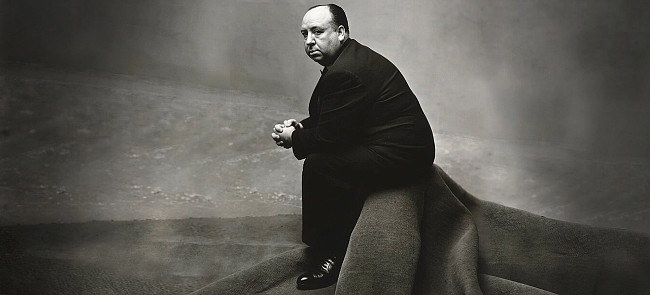 A century after Alfred Hitchcock began his career as a filmmaker, Mark Cousins imagines the master ushering the viewer through his work, offering insights and witty observations. Cousins playfully imagines what Hitchcock would have made of today's world, and how we now see his. What emerges is a fanciful abstract about the art of moviemaking itself, using Hitchcock's groundbreaking inventiveness to reveal cinema's secrets. Speaking to a present-day audience, Hitchcock (voiced by McGowan) explores how his life and movies often involve escape fantasies, luring the viewer from everyday reality into a constructed fiction. He explores desire that pulls people into illicit situations, which he depicts in ways that subtly circumvent censors. He speaks about how his characters are often profoundly lonely, even in crowds, and how the audience is often hyper-aware of the insistence of time. He seeks fulfilment of some kind for his characters, the audience and himself. And he frequently plays with height in purely cinematic ways. Using these ideas as chapters, Cousins assembles this unusual narrative with a fabulous archive of clips going back to Hitchcock's earliest silents, intercut with both intriguing contemporary sequences and stills of the man himself staring at us with those penetrating eyes. This soundalike mellifluous voice walks through the notorious tricks he used to mesmerise viewers and, by extension, amuse himself. The film rolls along with a gently purposeful momentum, darting through Hitchcock's filmography to find vivid examples of each point the voiceover makes. "You do know that films are lies, don't you?" Hitchcock says wryly, admitting that he loves playing with his audience, prodding them along, provoking their deeper yearnings and sparking the imagination to travel into some especially chilling places. In a fanciful way, this documentary allows Hitchcock to directly say things he said wordlessly with his expressive filmmaking skills. And elements of his personal life are revealed through both specific film scenes and recurring themes. This is a film about what Hitchcock gave to cinema, from a continual sense of visual surprise to the refusal to simply photograph people talking. He was one of the first filmmakers to use colours with such effective precision. And even though his films are often unbearably intense, he rejected the expected sombre tone, adding wit and romance in the most unusual places. Of course, the ultimate joke is that none of these things were original, but the potency of his talent makes his movies indelible.
| ||||
|
Name Me Lawand Review by Rich Cline | 
| |||||
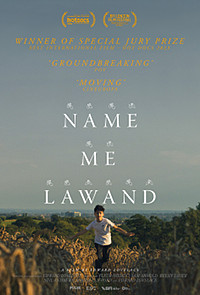 dir-scr Edward Lovelace prd Fleur Nieddu, Sam Arnold, Beyan Taher, Neil Andrews, Marisa Clifford, Edward Lovelace with Lawand Hamad Amin, Rawa Hamad Amin, Gulbahar Abbas Hussein, Rebwar Hamad Amin, Ladi Hamd Amin, Sophie Stone, Lucy Feyi-Sobanjo, Hudayfah Al Mujahid, Rudolf Kunickis, Helen Shepard, Louise White release UK 7.Jul.23 22/UK 1h22  Now streaming... |
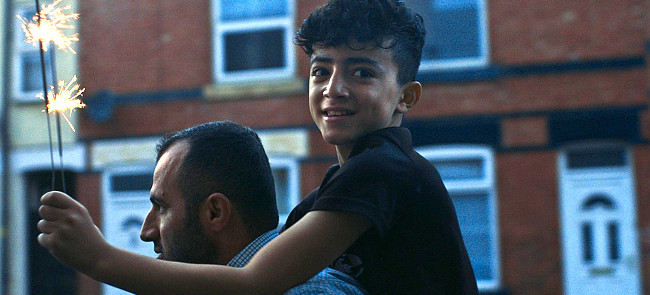 Immersive and deeply moving, this documentary takes the audience into the perspective of a young deaf refugee from Kurdistan, exploring each aspect of his identity through interviews, home movies and reenactments. Because it's so intimate, the audience will identify with young Lawand in a number of unexpected ways while falling in love with this smart, cheeky boy who is still discovering that the whole world is open to him. Born deaf in Iraq, Lawand's parents Gulbahar and Rebwar knew he couldn't remain in a place where being different was a death sentence. So when he was 5, his family fled to Britain. At a school for the deaf, Lawand learns British Sign Language and can communicate for the first time. His curious mind propels him to imagine a world where he belongs, where he isn't "different". But the British Home Office threatens deportation for the next seven years, cruelly arguing that he could just learn another language back home. Which of course is far from the truth. Infused with Lawand's buoyant energy, the film traces his journey from a young boy, who dreams of fleeing to a distant planet where perhaps everyone is like him, to a teen who begins to understand that he can have a full life here on Earth. And perhaps he can even help make this world a better place. Alongside the family's legal battle with the Home Office, the film traces the grass roots movement to pass the BSL Act, creating equal rights for deaf people in the UK. Lawand is a huge character, charming and energetic. He loves playing football with his best friends Hudayfah and Rudolf, deaf kids with different but equally compelling back stories. And his protective big brother Rawa begins to see that perhaps after years as his only companion and guardian, Lawand now has something to teach him. Meanwhile, Lawand's parents are slow to study sign language, but eventually they realise that they need to be part of Lawand's world rather than vice versa. Through all of this, the dedication of Lawand's teachers is powerfully inspirational, as they help him see what is possible. And he never forgets the anonymous deaf volunteer who spotted him in a refugee camp, taught him his first signs and changed his trajectory. While the editing and music might be a bit insistent on making the film emotional and uplifting, the story itself earns the sentiment. Lawand is a striking young man who will win the hearts of everyone who sees this film.
| ||||

See also: SHADOWS FILM FESTIVAL © 2023 by Rich Cline, Shadows
on the Wall
HOME | REVIEWS | NEWS | FESTIVAL | AWARDS
| Q&A | ABOUT | TALKBACK | | ||||

